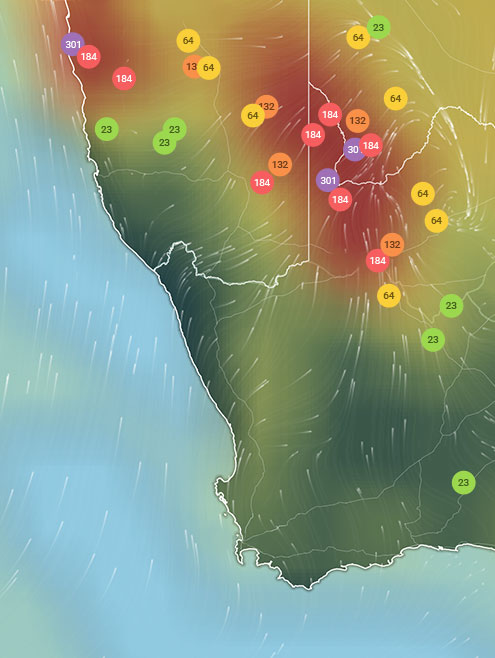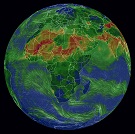Get a monitor and contributor to air quality data in your city.
220 people follow this city






AIR QUALITY DATA CONTRIBUTORS
Find out more about contributors and data sources| Weather | Thunderstorm |
| Temperature | 89.6°F |
| Humidity | 70% |
| Wind | 12.7 mp/h |
| Pressure | 29.7 Hg |
| # | city | US AQI |
|---|---|---|
| 1 | Kuala Lumpur, Kuala Lumpur | 77 |
(local time)
SEE WORLD AQI RANKING
| # | station | US AQI |
|---|---|---|
| 1 | Seberang Perai | 48 |
(local time)
SEE WORLD AQI RANKINGUS AQI
48
live AQI index
Good
| Air pollution level | Air quality index | Main pollutant |
|---|---|---|
| Good | 48 US AQI | PM2.5 |
| Pollutants | Concentration | |
|---|---|---|
| PM2.5 | 11.5µg/m³ | |
PM2.5
x2.3
PM2.5 concentration in Simpang Ampat is currently 2.3 times the WHO annual air quality guideline value
| Enjoy outdoor activities | |
| Open your windows to bring clean, fresh air indoors GET A MONITOR |
| Day | Pollution level | Weather | Temperature | Wind |
|---|---|---|---|---|
| Monday, Apr 22 | Moderate 53 AQI US | 87.8° 78.8° | ||
| Tuesday, Apr 23 | Good 48 AQI US | 87.8° 78.8° | ||
| Wednesday, Apr 24 | Moderate 54 AQI US | 87.8° 78.8° | ||
| Today | Good 48 AQI US | 89.6° 78.8° | ||
| Friday, Apr 26 | Moderate 55 AQI US | 87.8° 78.8° | ||
| Saturday, Apr 27 | Moderate 57 AQI US | 87.8° 78.8° | ||
| Sunday, Apr 28 | Moderate 53 AQI US | 87.8° 78.8° | ||
| Monday, Apr 29 | Good 42 AQI US | 86° 78.8° | ||
| Tuesday, Apr 30 | Good 43 AQI US | 86° 78.8° | ||
| Wednesday, May 1 | Moderate 51 AQI US | 86° 77° |
Interested in hourly forecast? Get the app
Simpang Ampat is a small city in the northernmost region of Malaysia, located on the mainland opposite Penang island. It ranks at 32nd place out of all cities in Malaysia, with this number coming as an average taken over the year of 2019. Its PM2.5 reading was 14.9 µg/m³, putting it into ‘moderate’ rating bracket. Any city with a yearly average of a moderate rating can be said to have decent air quality, but with room to improve. For a small city located right next to the coast, a moderate rating means that there will be a fair amount of pollution present at all times, in the form of smoke and haze created by cars and trucks, as well as other causes such as local (as well as foreign) fires used to burn refuse as well as dead organic matter.
To be classed as a moderate ranked city requires a PM2.5 rating between 12.1 to 35.3 µg/m³. This places Simpang Ampat in the lower end of this category, missing out on a better ranking by a very small margin of only 2.9 µg/m³. As such, the pollution levels in Simpang Ampat are not of significant concern, but citizens should be cautious as to when the levels of PM2.5 in the atmosphere climb, by referring to air quality maps and staying up to date on rising pollution levels.
The main causes of pollution in Simpang Ampat are ones that occur throughout the majority of cities in Malaysia as well as many of the surrounding countries in the region. They would include sources such as mobile ones, meaning pollutive emissions from cars, buses, trucks as well as planes, with the last one being more unique to Simpang Ampat due to its close proximity to an airport, with Penang international airport sitting within the 20km range of Simpang Ampat’s coastline. The city is also host to some stationary sources of pollution such as factories and other industrial facilities, a quick look at google maps revealing a high concentration of these facilities within the city’s limits, with several plastic production factories situated there as well as a large number of manufacturing plants and food related industrial sites. These would be responsible for the output of large amounts of smoke and pollution, as well as fine particles of metal, plastic and other combusted organic matter that can enter the atmosphere and combine with other pollutants to create more noxious compounds that become part of the PM2.5 collective.
The mobile industry of cars and buses, as well as ships, would also be of concern, with the waters between Simpang Ampat and Penang island hosting a large number of cargo ships going back and forth, with their emissions often containing higher amounts of chemicals such as Sulfur due to more lax regulations regarding fuels allowed for ship use. Cars, buses and trucks would also be constantly travelling through and past Simpang Ampat’s city limits in large number, with two bridges leading in and out of Penang island providing access for the high volume of commuters, traveler’s and tourists (with Penang island being a major tourist destination) as well as food and industrial material transport being moved by large trucks, often running on diesel fuel. With such a large number of vehicles being in close proximity to the city, it would be expected to suffer from the pollution fallout, with PM2.5 compounds such as Nitrogen Dioxide (NO2) and Sulfur Dioxide (SO2) being the main pollutants released from engine and fuel combustion. On a smaller note, Simpang Ampat would also suffer from the haze and smoke that comes in from the slash and burn farming practices taking place in Indonesia, mainly Sumatra, although according to the data taken during the year of 2019, the spike in air pollution was nowhere near as significant as other cities in Malaysia, with its geographical location providing a natural barrier against the buildup of the foreign-born smoke particles.
Observing the PM2.5 data recordings taken over 2019, the month that suffered from the worst pollution was, as with nearly every city in Malaysia, September. Following the trend in regards to this rise in pollution is an instant drop in pollution levels following the month of September, with October coming in at a PM2.5 rating of 11.3 µg/m³, putting it into the ‘good’ rating bracket, which requires a reading between 10 to 12 µg/m³ to be classed as such. This is less than half of the preceding month of September, which had a reading of 23.2 µg/m³, classing it as moderate, although of note this moderate reading is considerably higher than its yearly average rating of 14.9 µg/m³. Once again, the reason for this rise would be the drifting of smoke and haze from fires started in Indonesia over to Malaysia, adding to the ambient levels of pollution already caused by the aforementioned vehicular and industry related emissions.
The health effects of primary concern from breathing in polluted air and fine particulate matter would be mainly respiratory related illnesses, as well as the possibility of heart and cancer related issues. The extremely small size of PM2.5 (as well as the larger sized PM10, which is still harmful but not quite as damaging as its smaller cousin) allows it to penetrate deep within the respiratory system and be circulated throughout the body, causing a myriad of problems. The larger PM10 particles can cause external symptoms such as eye, throat and skin irritation, as well as an increase in the risk of respiratory infections and the triggering of preexisting conditions such as asthma. Vulnerable demographics, particularly young children and those with a predisposition to lung related illnesses should take care to stay up to date on the level of pollution occurring in Simpang Ampat, and take appropriate measures such as the wearing of appropriate masks or avoiding outdoor activities during heightened PM2.5 readings.
With its 2019 PM2.5 reading of 14.9 µg/m³ placing it in 32nd place of out all 60 ranked cities in Malaysia, Simpang Ampat has a fairly respectable ranking, but with plenty of room for improvement. It is ranked worldwide as number 1253 out of all the most polluted cities in the world. With initiatives to reduce the amount of industry related emissions and vehicle activity taking place, it could see its reading drop down to a good reading, similar to the city of Kuah, which came in with a 2019 average of 11.9 µg/m³, putting it into the ‘good’ rated category by a fine margin. With Simpang Ampat having three months during 2019 coming in with a good ranking, a further push to reduce levels of PM2.5 could get other months into the good category and offset the damage done during the month of September, allowing it to get an even more respectable ranking and improving the quality of air that its citizens breathe.
1Contributor
Government Contributor

1 station
1 Data source